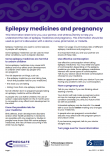Phenobarbitone
Sounds like 'fee-noh-barb-a-tone'
Key points about phenobarbitone
- Phenobarbitone is used to treat epilepsy.
- Phenobarbitone is also called phenobarbital.
- Find out how to take it safely and possible side effects.

Phenobarbitone is used to treat epilepsy by preventing seizures. Phenobarbitone blocks certain kinds of nerve activity and in this way reduces seizures. Read more about epilepsy.
In Aotearoa New Zealand, phenobarbitone is available as tablets (15 mg and 30 mg) and can be given as an injection in the hospital. It can also be made into a syrup by your pharmacy – note they will need time to prepare this.
- The dose of phenobarbitone will be different for different people.
- Always take phenobarbitone exactly as your doctor has told you. The pharmacy label on your medicine will tell you how much to take, how often to take it, and any special instructions.
- Read what to do if you think a child or someone else has taken a medicine that's not for them.
- Timing: Phenobarbitone is usually taken once a day, at bedtime. Take your dose at about the same time each evening. You can take phenobarbitone with or without food. Swallow your tablets with a glass of water.
- Missed dose: If you forget to take your dose, take it as soon as you remember. But if it's nearly time for your next dose, take the next dose at the right time. Don't take extra doses to make up for a forgotten dose. If you're not sure what to do, ask your healthcare provider.
- Keep taking phenobarbitone every evening: See tips to help you remember to take your medicines regularly. It may take a few weeks before you notice the full benefits of phenobarbitone. Don't stop taking phenobarbitone suddenly; talk to your doctor or nurse before stopping.
Here are some things to know when you're taking phenobarbitone. Other things may be important as well, so ask your healthcare provider what you should know about.
Taking other medicines and supplements
Phenobarbitone interacts with many other medicines, herbal supplements and rongoā Māori, so check with your healthcare provider or pharmacist before starting phenobarbitone and before starting any new products.
Phenobarbitone may affect your ability to drive
Phenobarbitone can impair your ability to do some tasks, eg, driving or using machines. Alcohol makes these effects worse. Discuss this with your healthcare provider.
Tell your healthcare providers
Make sure you tell anyone providing you with health, dental or medical care that you're taking phenobarbitone.
Don’t stop phenobarbitone suddenly
Talk to your healthcare provider before stopping and they can advise you how to stop taking it gradually.
Contraception
Use 2 forms of effective contraception (eg, condoms and another kind) for the whole time you're taking phenobarbitone and for 4 weeks after stopping it. Talk to your healthcare provider before choosing your second method, as some contraceptives may not work as well while you're taking phenobarbitone, and for 4 weeks after you've stopped taking it. Read more about epilepsy and contraception.
If you are planning a pregnancy
- It's important to contact your healthcare provider 6 to 12 months before you want to become pregnant. Read more about epilepsy and pregnancy.
- If you become pregnant: Contact your healthcare provider immediately but don't stop taking phenobarbitone until you've discussed it with them. There are risks to yourself and your unborn child from uncontrolled epilepsy.
- For more information, read:
Like all medicines, phenobarbitone can cause side effects, although not everyone gets them. If you're concerned about any symptoms you think might be related to your medicine, talk to your healthcare provider. The following information offers some guidance but doesn't include all possible side effects.
Common side effects
Tell your healthcare provider if these side effects bother you.
- Feeling sleepy, drowsy or dizzy: Be careful when driving or using tools until you know how this medicine affects you. Limit or avoid alcohol as this can make these side effects worse. Read more epilepsy/seizures and driving(external link).
Tell your healthcare provider immediately or phone Healthline free on 0800 611 116 if these occur
- Low mood, suicidal thoughts – thoughts of harming yourself.
- Skin rash, skin peeling or blisters.
- Sore mouth or throat, mouth ulcers, easy bruising, nosebleeds, bleeding gums, shortness of breath, fever or infection: You may need a blood test to check the medicine isn’t affecting your white blood cells or platelets.
- Signs of problems with your liver such as severe tummy pain, yellowing of the eyes and skin, dark urine.
Read more about medicines and side effects and reporting a reaction that you think might be a side effect.
The following link provides further information on phenobarbitone:
Phenobarbital(external link) NZ Formulary Patient Information
Brochures
References
- Phenobarbital(external link) New Zealand Formulary
Brochures

Medicines and side effects
Healthify He Puna Waiora, NZ, 2024

Epilepsy medicines and pregnancy
Medsafe, NZ, 2025

Health Quality and Safety Commission, NZ, 2019 English, te reo Māori
Credits: Healthify editorial team. Healthify is brought to you by Health Navigator Charitable Trust.
Reviewed by: Angela Lambie, Pharmacist, Auckland.
Last reviewed:
Page last updated:





